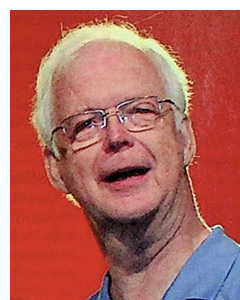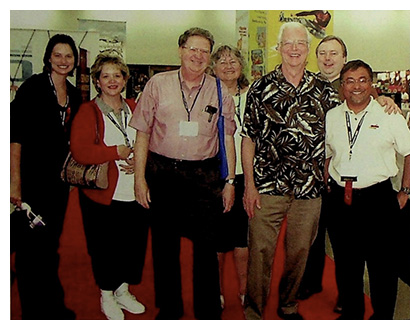
By Brad Dupray
When the city of Calgary, Alberta, celebrated its centennial, Allan Dunbar was selected as one of three of the most inspirational people in its history. During 22 years as senior pastor of Bow Valley Christian Church in Calgary, where he had a national television ministry, Allan earned the respect of his countrymen, enough to spend five years on the Canadian Olympic Development Committee while leading the spiritual outreach for the 1988 Winter Olympics. Allan’s respect was well-earned within the Christian world, as well, having served as dean of the Billy Graham School of Evangelism, president of Puget Sound Christian College, president of the 1989 North American Christian Convention, and as executive director of the convention since 2001.
_ _ _
What has surprised you during your time with the North American?
The diversity of our fellowship. While I knew it was there, both ethnically and traditionally, it ran the gamut from extremely orthodox to extremely contemporary. I have come to believe that is one of the greatest strengths of our fellowship.
Sounds like a match of gifts to needs.
It’s so exciting to see that we have congregations really interested in helping their members use their giftedness. It’s like what Paul said to Timothy, “Stir up the gift of God which is in you” (2 Timothy 1:6, New King James Version)—rather than just plugging people into slots. So if you’re living in a small country town, don’t try to match the style of an ultracontemporary town. What’s the giftedness of your people?
What has pleased you?
I came from one of the few small churches of Canada, so it is not long before you feel rather insignificant, compared to other evangelical denominations. In this role I witness the vibrant growth and the creative ways of marketing and Christian service. One highlight is the dynamic impact our church planting movement is having. I think these are some of the best days ever for the Restoration Movement.
What has disappointed you?
I think unity is something we haven’t pushed like our original forefathers did. I am still perplexed by how those in a unity movement can have such distrust of one another. We can become quite denominational by establishing our own little groups based on personal likes and dislikes without rejoicing with what is going on around us—whether we like the style of music or methodology.
Has the megachurch movement been polarizing?
I’m excited about our megachurches but disappointed that at times they seem to be existing just for themselves. The sense of family can erode if we don’t understand the blessing of both large and small.
How can megachurches better connect themselves to the movement?
Our megachurches should consider the needs of small and middle-size congregations—or as I like to call them, “smalltown churches” (some of them don’t have any other choice). As an example, the convention could be greatly enhanced financially if the megachurches could contribute “X” number of dollars, that could lower the cost to churches who don’t have the wherewithal to send their leadership. If one hundred of our megachurches could give the convention $10,000 per year, the financial troubles of the NACC would be eliminated. We could get back to a reasonable registration rate and really help our small churches.
I’m sure their hands-on participation makes a difference, too.
Our megachurches often do things bigger and better, but I wish they could see the blessing they could be to the NACC. When a Bob Russell walks through the halls of the NACC you have to ask yourself, “What’s in it for him?” I don’t really know. But I do know his presence is a powerful statement to small and struggling churches. If it’s “good enough for Bob Russell” it’s something small churches can get excited about.
How do you feel the North American is doing?
I see a strong renewal of interest in the North American Christian Convention. I think we are doing things with excellence and that’s been encouraging to young and old preachers and leaders. I’m thrilled our churches are growing and these new churches have such a stabilizing effect for the future.
You have many contacts in the evangelical world; how are we perceived by them?
I travel in many multidenominational circles, and for the first time in my ministry, they are excited about what they hear about the Christian churches and churches of Christ. They want to know how we plant churches so well. “How do you do your missions?” “You mean you’re free to just preach the Word?” There’s strong interest in the book of Acts among many of these mini-denominations. We have had a chance to model the importance of the Lord’s Supper and Christian baptism and the preaching of the Word. With that as our style, the future’s pretty bright.
Do you see a difference in approach in different parts of the country (for example, the Sunbelt vs. Midwest)?
Yes. Each region has a historical perception. Like, “the East is ultraconservative” and “the West is off-the-wall liberal,” both in style and maybe even in what they view the Restoration Movement to be. But now things are changing. Whether you’re in the Northeast or the Southwest, worship services are run in a more contemporary style.
How have programming changes affected things?
Young families are showing interest because of our heart for kids. I hear of unique special days happening in every section of the country. At the church I attend, on Father’s Day, we have a hot rod classic car show that brings dads to church who have never been. Visit some of our new campuses in all parts of the country and you’ll see a unique emphasis on a building style that would accommodate the wants and needs of youth. There is praise and worship that allows people with instrumental talents to use it in a church setting, and much more of an emphasis on a “place for everyone.”
Why does our movement need the NACC?
Without something like the NACC it would be difficult to enhance fellowship and purpose for a movement such as ours. One example would be in the state of Washington. Because Puget Sound Christian College is no longer in existence, there is no group that feels the responsibility to bring Christians from all of that state’s churches together. We’ve lost connection and fellowship. Praise God for the North American Christian Convention that provides connection, identity, inspiration, and fellowship for a loosely connected brotherhood.
It’s hard, however, for people not living in the Midwest to connect to a “Midwestern” convention.
I think those of us who live on the fringes of the country are aware that the heart of our movement is in the Midwest. If the program and blessing is there, I believe we’ll have people willing to come. Travel time is certainly shorter than when this convention was originally formed. It shouldn’t matter where the convention is located. It requires time and effort for everyone. For example, many from Toronto have come—they’ve tasted, they’ve seen it is good, they’ll come back.
Are we maintaining our distinctiveness as a movement, or are we simply melting into the evangelical pool?
There are a lot of people afraid that [the latter] could be happening. I don’t think it has. However, we haven’t done a very good job in holding up the unique principles of our Restoration heritage. I’m not suggesting we have to go through the minutiae and details of the statements and lifestyles of the Campbells, Scotts, and Stones, but the principles that allowed us to become the fastest-growing indigenous movement of the late 1800s are still principles that will work today. I hope we never get soft on the unique positions we hold on weekly Communion, baptism by immersion, and New Testament Christianity. These are why we are who we are.
Why is it important to remain unique?
Because we’re a Bible people. Realistically, there seems to be a watering down of biblical doctrine. In many denominations, I see the lowering of biblical expectations in order to hold on to their flock. In Canada, where I used to serve, the United Church of Canada used this approach. There was a merger in 1925 between Methodists, Episcopalians, and Presbyterians that precipitated a watering down of biblical doctrine. As the years passed they became liberal on everything. Today they are disappearing from the Canadian mosaic. People want clear teaching; if we’ll just preach the Word, seek unity in Christ, and constantly reach out in love to others, we’ll be a unique body of believers that is attractive to people today.
How does the NACC help us define that distinctiveness?
The NACC can be an avenue to discuss heritage and its application to contemporary Christianity. For instance, at the most recent NACC we had three buses full of folk who went to visit the Cane Ridge property. This was a very focused presentation of our Restoration history. Would that have happened if the NACC had not promoted it? We have open workshops and forums to do a contemporary translation, with specifics, on how our heritage principles should be used today. The NACC is an avenue for such discussions to happen.
Why do you think local church ministers shy away from talking about the Restoration Movement?
I think that’s a product of our independence. Our churches have become very focused on now. They see church life as a contemporary moment in time—their moment in time. History in the modern mind often means we’re going backward, not forward. One area where a number of our churches are increasing their teaching on our history takes place in “101 classes” as church leaders teach new members who we are and where we came from. A good way to teach Restoration history is to have a series of lessons on the great slogans of the movement. A sermon series on these phrases would be a helpful way to teach our Restoration heritage.
Brad Dupray is senior vice president, ministry development, with Church Development Fund, Irvine, California.


0 Comments